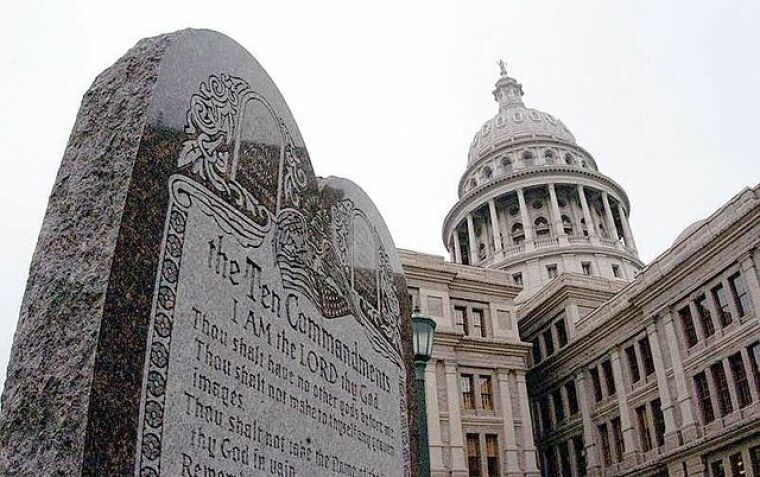Oklahoma House passes bill that would allow Ten Commandments on public grounds

The Oklahoma House of Representatives has approved a legislation that would allow the display of the Ten Commandments and other historically significant documents on public property.
The bill known as H.B. 2177, proposed by Rep. John Bennett (R-Sallisaw) in January, was approved by the House last Tuesday by a vote of 79–11.
Under the legislation, documents such as the Magna Carta, Mayflower Compact, Declaration of Independence, United States Constitution, Bill of Rights and the Oklahoma Constitution would be allowed to be displayed on public grounds.
Documents from other religions, such as Islam and Satanism, will not be included as the bill only applies to the display of historical documents that are influential in the founding of the state or country, according to Christian News Network.
The measure could possibly allow the Ten Commandments monument to return to the State Capitol.
In 2015, the Oklahoma Supreme Court forced the removal of the Ten Commandments monument from the State Capitol, stating that the display was unconstitutional. The monument was eventually removed in 2016 following months of lawsuits launched by groups that claimed the location of the display violated local laws and constitutional provisions against government support of a religion.
Last November, Oklahoma voters failed to support State Question 790, which would have allowed the Ten Commandments monument to be displayed on the grounds of the State Capitol. The question was aimed at removing a part of the state constitution that prohibits the use of state resources for religious purposes.
H.B. 2177 was opposed by the American Civil Liberties Union (ACLU), which argued that it elevates Christianity and alienates unbelievers.
"Continued attempts to place a religious monument on the capitol grounds sully the deeply held beliefs of many Oklahomans, marginalize people of minority faiths and those of no faith at all, and amount to a monumental waste of time and money," ACLU executive director Ryan Kiesel told Red Dirt Report.
"Regardless of what Rep. Bennett and other supporters of this misguided effort may claim, their actual intention is to elevate, for their own political advantage, an interpretation of one single faith above other faiths and above the conscience of those who have no religious faith at all," he continued.
The legislation authorizes the Oklahoma attorney general to "prepare and present a legal defense of the display" should its constitutionality be challenged in court. The measure is now headed to the Oklahoma Senate for consideration.
 Christians don't have to affirm transgenderism, but they can’t express that view at work: tribunal
Christians don't have to affirm transgenderism, but they can’t express that view at work: tribunal Archaeology discovery: Medieval Christian prayer beads found on Holy Island
Archaeology discovery: Medieval Christian prayer beads found on Holy Island Presbyterian Church in America votes to leave National Association of Evangelicals
Presbyterian Church in America votes to leave National Association of Evangelicals Over 50 killed in 'vile and satanic' attack at Nigerian church on Pentecost Sunday
Over 50 killed in 'vile and satanic' attack at Nigerian church on Pentecost Sunday Ukrainian Orthodox Church severs ties with Moscow over Patriarch Kirill's support for Putin's war
Ukrainian Orthodox Church severs ties with Moscow over Patriarch Kirill's support for Putin's war Islamic State kills 20 Nigerian Christians as revenge for US airstrike
Islamic State kills 20 Nigerian Christians as revenge for US airstrike Man who served 33 years in prison for murder leads inmates to Christ
Man who served 33 years in prison for murder leads inmates to Christ


 Nigerian student beaten to death, body burned over ‘blasphemous’ WhatsApp message
Nigerian student beaten to death, body burned over ‘blasphemous’ WhatsApp message 'A new low': World reacts after Hong Kong arrests 90-year-old Cardinal Joseph Zen
'A new low': World reacts after Hong Kong arrests 90-year-old Cardinal Joseph Zen Iran sentences Christian man to 10 years in prison for hosting house church worship gathering
Iran sentences Christian man to 10 years in prison for hosting house church worship gathering French Guyana: Pastor shot dead, church set on fire after meeting delegation of Evangelicals
French Guyana: Pastor shot dead, church set on fire after meeting delegation of Evangelicals ‘Talking Jesus’ report finds only 6% of UK adults identify as practicing Christians
‘Talking Jesus’ report finds only 6% of UK adults identify as practicing Christians Mission Eurasia ministry center blown up in Ukraine, hundreds of Bibles destroyed: 'God will provide'
Mission Eurasia ministry center blown up in Ukraine, hundreds of Bibles destroyed: 'God will provide' Church holds service for first time after ISIS desecrated it 8 years ago
Church holds service for first time after ISIS desecrated it 8 years ago Burger King apologizes for 'offensive campaign' using Jesus' words at the Last Supper
Burger King apologizes for 'offensive campaign' using Jesus' words at the Last Supper Uganda: Muslims abduct teacher, burn him inside mosque for praying in Christ’s name
Uganda: Muslims abduct teacher, burn him inside mosque for praying in Christ’s name